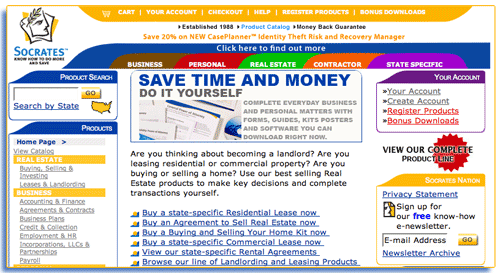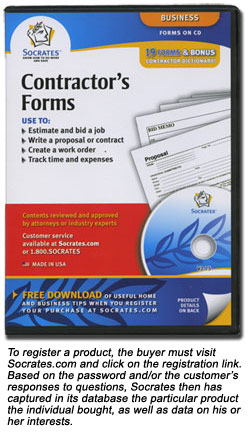By building effective conversion architecture, you can build a direct relationship with the customer—a relationship that can be monetized down the road by targeting marketing messages for relevant products of increasingly greater value. This is also the step where, unfortunately, many publishers slip up.
The online conversion architecture may take different forms:
- Send visitors to the website’s home page where they can click on a link to get to the specific page to register for the free giveaway, added information, or download. The upper right-hand quadrant of the home page is the most effective location for that link. On an organic home page with no or weak conversion architecture, however, you’ll be lucky to get a one-half percent conversion rate.
- Send visitors to a rapid-conversion landing page set up specifically for the purpose and with an area to register for the free giveaway, added information, or download. By enticing visitors to a rapid-conversion landing page, you might see a 35 percent conversion rate.
- Create a dedicated URL for the product with an area on the home page of that URL that has an area to register for the free giveaway, added information, or download. By tying a dedicated URL to your product you’re likely to double your click-through rate—and an additional URL can cost as little as $15 per year.
Once the customer arrives at the publisher’s website—whether that’s the home page, a rapid-conversion landing page, or a separate URL—access to the free offer or bonus information should require at least an email address. The registration page should also include a separate area with—or link to a page with—an offer to sign up for a free email newsletter tied to the customer’s area of interest.
Socrates Media, LLC, might be considered a “poster child” for this strategy. Perhaps you’ve seen Socrates Media’s kits—prepackaged legal forms such as rental agreements, deeds, contracts, wills, etc.—displayed in Staples, OfficeMax, Office Depot, Wal-Mart, Barnes & Noble, Costco, Kinko’s, and other retail outlets.
In August 2003, Socrates Media LLC acquired Made E-Z Products, which was the first company to offer prepackaged legal forms. Today, Socrates offers thousands of forms in several categories: small business, personal financial, business legal, personal legal, real estate, human resources, and contractors.
The Socrates kits sold in retail stores include a user’s guide, which illustrates all the relevant forms; checklists; templates, etc., for the particular topic. Since the retail store packaging is smaller in size than regulation-size forms—and because forms have jurisdictionally specific requirements—buyers are given, as part of the purchase price, a personal password to use on the Socrates.com website to register their purchase, access the specific forms that they need, and download them for free.
To register a product, the buyer must visit Socrates.com and click on the registration link. Based on the password and/or the customer’s responses to questions, Socrates then has captured in its database the particular product the individual bought, as well as data on his or her interests.
“Brick-to-click” business model
“We call this business model ‘brick-to-click,’” says Bill Lederer, Chairman and CEO of Socrates Media and also Founder of Art.com, an Internet-based company that pioneered the delivery of online art, custom framing, and art-related products and was one of the Internet’s earliest success stories. Begun on a relative shoestring in 1997, Mr. Lederer sold Art.com to Getty Images two years later for $200 million.
“With Socrates,” he says, “I’m trying to replicate parts of what I learned with Art.com. And that is that database-driven businesses do well on the Internet. I also like mass customization as an idea.”
Forms, of course, are price-sensitive; but the customer’s alternative is to hire a professional lawyer or accountant for hundreds of dollars an hour.
“That creates a natural umbrella for us,” says Mr. Lederer, “under which we can provide a lot of value.”
The first thing Mr. Lederer did when he acquired Socrates Media was to build a large-scale database of basic forms—“and there are, literally, tens of thousands of forms out there,” he notes. Each form has versions that comply with current laws and regulations for the various states. Someone who currently resides in Connecticut, for example, may be renting an apartment located in New York City. That person would want the form that’s specific to the New York jurisdiction.
“We have state-specific and county-specific forms—leases, contracts, wills, deeds, etc.—as well as more generic products,” says Mr. Lederer.
The forms can be downloaded, filled in electronically, edited, and saved. And because the legal requirements for the various forms change frequently, attorneys regularly update all Socrates products to ensure accuracy and current compliance.
Negative customer acquisition
Mr. Lederer also recognized the value in what he calls a “negative customer acquisition program.” Socrates sells its kits through retailers that include most of the major superstores and several thousand independent bookstores and stationers. Forms are also sold online at Socrates.com.
“We look at the retailer as being our marketing partner,” he explains, “one that is acquiring the customer for us and making our business profitable.”
The challenge for the product marketer (or publisher), therefore, is to create a direct relationship with each customer by identifying who they are, what their interests are, and then targeting specific offers that are relevant to them—without going through a middle man.
“Our focus,” he emphasizes, “is on making sure that we get the information that we need to cross-sell and up-sell other things to registered customers.”
Giving up an email address, of course, is part of the registration process. The percentage of retail customers who register to download the forms or other items ranges, depending on the product category and subject matter, from 10 percent to more than 50 percent. Socrates offers new registrants a choice of e-newsletters and other freebies, such as additional downloads or discounts on other products and subscriptions.
“We then use the email address for marketing purposes,” says Mr. Lederer, “but we don’t force anything down anyone’s throat. Everything is double opt-in, and we make it easy to unsubscribe.”
Socrates uses the e-newsletters to notify customers when forms are updated to correspond to changes in the law. The company also sends special-purpose emails. For landlords, for example, a special mailing might offer recipients a paid newsletter subscription, tenant screenings, access to other information, more forms, etc.
Again, depending on the product category and subject matter, anywhere from 10 percent to more than 50 percent of these customers will respond favorably to up-sell offers made during registration and/or cross-sell offers made immediately after registration or subsequently. These customers are also highly responsive to related advertising, according to Mr. Lederer.
The idea, of course, is to target the marketing messages. Real estate people get real estate promotions but don’t get promotions on divorce. A landlord might get small business promotions, but a divorcing person won’t get a promotion on contractor products.
Socrates is in the process of developing new websites with the intention of becoming more narrowly focused on specific user groups.
“We’ll soon have a separate website that is specific to landlords, for example, and another one that is specific to people getting divorced,” Mr. Lederer explains.
“We’re also loading the basic forms into a mass-customization engine that,” he says, “will allow us to offer consumers full customization of the forms for a small premium. Or they can buy a subscription that provides 24-hour-a-day access—which is like having an attorney sitting next to your desk and advising you on what you’d like to do next.”
Socrates already has more than 1,000 real estate forms loaded into the system that are available for full customization.
The company’s tracking system allows Socrates to know which marketing partner generated a particular customer. And depending on the partnership negotiations, Socrates may share revenue with the retail partner for having helped generate that business. “We haven’t found many companies that are willing to give the retailer a further piece of the action, but we’re happy to do that,” states Mr. Lederer.
Last year [2005] was Socrates Media’s first full year of business, “and we’re doing okay,” he says.
“We distribute our products through 5,000 retail marketing partners and have had more than 400,000 online registrations just in the first half of this year (2006).”
Mr. Lederer also estimates that “a majority” of product sales will be transacted online in the first quarter of 2007, compared to “zero percent” when the products were introduced in the second half of 2004.
Socrates Media began selling forms in the United States and has expanded into Canada with personal, legal, small business, and real estate forms. Mr. Lederer expects his forms to be available in other countries—“eventually.”
This article was written by Don Nicholas with the help of Jane E. Zarem. This is only one part of a whole series on using offline products to make money online.
See the rest of this series below:




